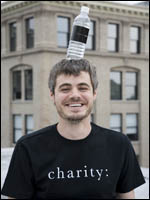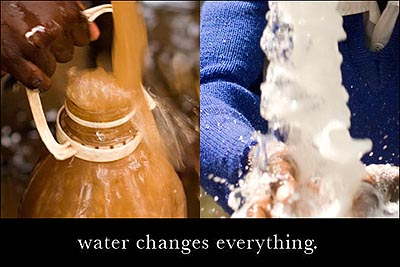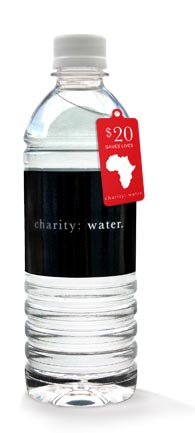Scott Harrison - Humanitarian

Harrison graduated from New York University in 1998 with a B.A. in Communications. After a 10-year foray into special event planning and promotions, he began a small upscale event planning and nightclub consultancy. His clients included MTV, VH1, ABC, Cosmopolitan, ELLE, Xbox (Microsoft), Universal Records, RCA, Island Records, Dunkin Donuts, Bacardi USA, Nike, Anheuser-Busch and more. In August 2004, he left the event business to serve for a year as a volunteer photojournalist onboard the Mercy Ship Anastasis in impoverished Liberia, West Africa. In September 2005, returning home to NYC, he tested the idea behind charity: by producing a large exhibition of his photographs and videos called mercy. Despite opening in the midst of the Hurricane Katrina disaster, Harrison's mercy. show was a success. Visitors contributed more than $96,000 towards providing medical procedures and freshwater wells in West Africa. Harrison returned to West Africa for another 6 month journey in October 2005, before returning to Manhattan in the spring of 2006 to found charity:.
One bottle of water plus one guy looking to add meaning to his life, doesn't necessarily amount to much on paper. But, in reality it works out to equal a lot of lives being saved and changed.
Scott Harrison is working miracles around the world as a result of his commitment to bring clean water to people in places where dirty filthy water is all there is to drink, and he is making a profound difference in the lives of many people along the way.
DR: Tell me about your life and about your work.
SH: I started the organization a year ago.
I launched charity: at my 31st birthday party in New York City. I had been a night club promoter for ten years and I woke up on a beach one day in Uruguay in what should have been the perfect life and I was completely miserable. I had sort of come back to my childhood faith and decided that I had gotten it all wrong. I was chasing all of the wrong things - materialism and money -- and I was selling a lifestyle of decadence and escapism for a living. I came back to New York committed to trying to find a way out of that.
I rented my apartment and left New York and committed a year of my life to humanitarian service. I found an opportunity on a hospital ship in Liberia. At that time, Liberia was the poorest country in the world, which was really interesting because my life had been about hanging out with some of the richest people.
I taught myself how to take pictures by reading a Nikon magazine manual and then I picked up a camera and embedded as a volunteer photographer with these amazing surgeons in Liberia on what was called a -
Mercy Ship.
We lived on a huge ship, a converted cruise liner, which was turned into a hospital. There were about 350 people, all of us volunteering with this organization. We saw thousands and thousands of people. Within three days, I had gone from a night club in New York City, to this parking lot in Africa, where, from five to seven thousand people came to us deformed, with huge tumors, huge clef lips; they were blind with cataracts, they were lame with water born diseases....
I remember crying most of the morning because I had no paradigm for what it was I was seeing. We helped as many people as we could but by the second day we had to turn away about 3,000 people because we just didn't have the capacity to help. We had filled up the next eight months of our operating capacity in about thirty six hours -
"You'll have to come back next year or the year after."
I never really looked back from that point.
I spent a year and a half volunteering for Mercy Ships and then I came back to New York and did a big exhibition in Chelsea, showcasing the photographs that I had taken on the ship. We raised about $96,000 and the idea of starting a charity came out of that experience - using photos to tell peoples stories and stimulating smart giving, and using the camera to prove how the money really made a difference in people's lives.
Traveling throughout Africa I saw that the greatest need was for clean, safe drinking water and basic sanitation. Eighty percent of all disease is caused by bad, unsanitary water so if there were five to seven thousand people standing in that field -- a lot of didn't have to be standing there.
I love the work of Mercy Ships but I wanted to create something that could have an exponential impact and touch millions of lives and water was really the only issue to start with.
There are 1.1 billion people without access to water which is one in six of us. More than two in six of us don't even have the dignity that comes with being able to use a toilet.
There was a lot of work to be done. We could raise awareness about the issue and then raise money and go into these communities and give people clean, safe drinking water. And, we could prove it by giving pictures and GPS coordinates and show people how their twenty dollars or their ten thousand dollars had made a difference.

Right now, more than 1.1 BILLION people in the world, mostly in developing nations, do not have access to clean, safe drinking water.
Unsafe water and lack of basic sanitation causes 80% of all sickness and disease, and kills more people every year than all forms of violence, including war. Many people in the developing world, usually women and children, walk more than three hours every day to fetch water that is likely to make them sick. Those hours are crucial, preventing many from working or attending school. Additionally, collecting water puts them at greater risk of sexual harassment and assault. Children are especially vulnerable to the consequences of unsafe water.

Of the 42,000 deaths that occur every week from unsafe water and a lack of basic sanitation, 90% are children under 5 years old.
We believe access to clean water is a fundamental human right. And we're doing something about that.
Since charity: was founded and began activity in August 2006, we have funded the development of 200+ wells in 6 african nations through the work of exemplary humanitarian organizations like Living Water International, Concern Worldwide US, Healing Hands International, and Water For People. When completed, these wells will serve 100,000 people with clean, safe water.
You can help us. With proper funding and the development of sustainable water systems in communities that can support them, watch as lives are transformed.
Visit charity: water to learn more.
DR: I am just considering the fact that the water in my building tomorrow is going to be turned off between 10:00 AM and 4:00 PM...
SH: (Laughing) I have been hearing this a lot this week...
DR: Really?!
I mean, I am so irritated because I am having to rearrange my whole day. It is completely annoying. I work from home and so it is not okay to not be able to flush the toilet or cook or do the dishes or wash your hands...
I am seeing how much I right here in this conversation how I take water for granted. I mean, I am bent out of shape about not having water at my disposal for a few hours. I can't imagine...
SH: Yep...
DR: The temptation, I am sure Scott, is to minimize the extraordinary impact that you are making on people's lives in a very real way. But, at the end of the day when it is just you all by yourself, what does it feel like to be doing this kind of work?
SH: Gosh, I don't really know how to answer that.
It is just really what we do. It is an honor to be able to wake up and to be in a situation where I can meet someone who has a need that I can help meet. That is especially satisfying for me.
The only reason that I would have known about Nai was out of my experience on the ship. I knew from my experience that we could definitely help her.
I met some people in Ethiopia who had clef lips and because of my extensive surgery experience, working in Liberia, were able to get them the surgery they needed.
It's nice to be able to use your experience to make a difference in just one person's life; one kid's life.
DR: You talked before about waking up on the beach and how life should have been perfect but it wasn't. How close would you characterize your life now, in contrast to that day.
SH: Well, I certainly work a lot harder.
Most days I start at 8:00 AM and I go until midnight, but I love it! I worked two days a week when I was throwing parties and I had plenty of time to travel when I was only living for myself.
I am very lucky to be able to do what I do...
I am healthy and I will probably never go hungry in my lifetime. I go to countries like Ethiopia and work with people who don't have clean water and I can afford to buy clean water and throw it in the back of the jeep...
DR: Do you ever get frustrated because you can't do more?
SH: I am very, very "The glass is half full".
I focus on what has been done and what can be done. If there are a billion people and we helped 100,000 of them this year then next year we will get to a half a million of them and the next year maybe we will get to a million of them clean water. Because I was taking pictures of individuals, it was all about the one, rather than "the five thousand". That first surgery would have almost made the whole year worth it.
There was this one woman called Beatrice.
Beatrice was about 40 years old and she was essentially suffocating to death. She was sucking food through a straw into her nose because her mouth was blocked by a tumor. She was living in a cave-like hut in the center of Monrovia, which has a million people. Imagine this woman, surrounded by a million people, in the capitol city in a country where there is nothing that can be done because there is no surgeon that can help her. So, she just prays to God for fifteen years, that He will send someone to deliver her and then, someone finds her and brings her to the ship and she is saved from suffocating to death by a whole group of people. Afterward, the surgeon got up in front of the whole crew and said if all three hundred and fifty of us were here with all of the millions of dollars that it takes to run this organization, just to answer Beatrice's prayer, that makes it all worth it. That was an important moment for me.
So, I think you just focus on the village that you did bring clean water to and then you just go on to the next.
Looking back, we had 200 villages to do in one year and 96 of them are already done. None of us thought that it would work this well and that we would be able to distribute as many resources as we have.
DR: Do you consider yourself to be successful?
SH: Well, I am pretty good at being able to get people to listen.
I am lucky that I have the crutch of the photos. It really isn't me at all. It's just me showing a picture and it is the person in the photo that speaks into the hearts of people. I am just a middle man in a way.
DR: But, do you consider yourself to be personally successful.
SH: Sure. How could I not. Success would have been digging five wells. Success would have been helping one little girl.
DR: What do you see when you look down the road?
SH: We have talked about adding other issues to the portfolio. Maybe look for us in 2009 to start Charity: Education. That might look like a twenty dollar black pencil where a hundred percent of the money goes to build schools and we prove the schools with photos, videos and GPS coordinates so people can see what their pencils added up to but -
We will never stop doing water.
We are always trying to relate water to other issues. We are building these water systems in hospitals and we are doing our first school and then another ten schools in Honduras in January. Water directly effects education in that often a thousand kids will come into school in the morning and have to drink water that is not even clean.
DR: What is the best part of your life right now?
SH: If it were up to me I would spend ten or eleven months a year in Africa or in developing nations and just a month or two back home. Unfortunately it is the other way around. Every minute that I am on the ground in Africa is the best part.
DR: A hundred years from now what do you want to be remembered for?
SH: Just being able to lift people, that otherwise wouldn't have had a chance, out of extreme poverty.
DR: Anything else?
SH: I am more excited about the pictures and the stories about the people, than I am in my own story...
What we did with our year anniversary was especially special. We found these hospitals in Kenya that needed clean water. We made a video to illustrate the need and then went to all of our supporters and asked them to send thirty two dollars. It was my 32nd birthday and I promised that if we could raise enough money I would fly back to Kenya and drill a well there. The response was overwhelming. By the time I was on a plane to go and drill that well we had about $60,000. Now we have about $120,000 so that three hospitals will get clean water. There are about 12,000 that need it.
We followed through and made videos of us drilling these wells and sent those back to all of the donors to show them exactly how their money was achieving something.
DR: Mmmm...
Well, this is certainly not intended as a trick question in any way but -
A hundred years from now, what do you want to be remembered for?
SH: (Laughs) Ah! Let's say:
Bringing clean water to a hundred million people! (Laughs)
Thanks Scott!
Buy Water

Your $20 donation can give a person in Africa clean water for 20 years.
Click here Buy Water.
We're always looking for volunteers to help with daily office tasks. We're also gearing up for the holiday season, our busiest time of year, and will need volunteers for charity: water events such as the annual charity: ball.
If you are interested in helping out, please fill out our volunteer form so we can learn a bit more about you and how to best utilize your talents.
For further inquiries, please email volunteer@charitywater.org
